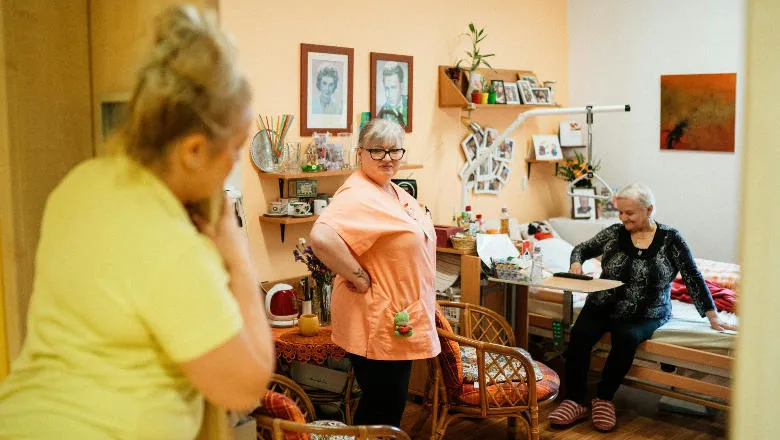27 January 2025
£1.6m research to address value for money in home social care
Unit Deputy Director is co-applicant on a project led by the University of Kent

A collaboration led by the University of Kent has been awarded £1.6 million by the National Institute for Health and Care Research (NIHR) Policy Research Programme to assess the value for money social care services provide to people receiving care and to their families.
Professor Ann-Marie Towers, Deputy Director of the Health and Social Care Workforce Research Unit at King's, is a co-applicant on the study. She co-leads on sector engagement and communication, and will provide expertise on outcome measurement, participant recruitment and comparisons with residential care. Prof Towers said:
'At a time when publicly funded care is reserved for those with the greatest need and fewest resources, high quality evidence on the costs and benefits of ‘home first’ for individuals and their families is imperative. This multidisciplinary collaboration of researchers, sector partners and people with lived experience will consider the broader context in which care at home is delivered, including the suitability of housing, availability of unpaid support and funding availability.'
More about the study
Dr Florin Vadean and Dr Olena Nizalova from the Personal Social Services Research Unit (PSSRU) are leading the three year collaboration with researchers from King’s College London, social research specialists at Ipsos, analysts at Skills for Care as well as provider organisations’ representatives from the Homecare Association and the Housing Learning and Improvement Network. The project is also supported by the Care Quality Commission and the NIHR Research Delivery Network.
Care provided in peoples’ own homes – home care or domiciliary care – is becoming an increasingly important part of social care. Services vary from regular daily visits to 24/7 live-in care and support, with or without complex clinical interventions; and some people are directly employing care staff (i.e., Personal Assistants – PAs). They can vary dramatically in quality, price, and availability, some are regulated while others not, and there is currently little evidence of the value these services provide to people who rely on care and support, their families, and the taxpayer.
This research project seeks to provide a better understanding of the value of care services at a time when the new Government are emphasising a ‘Home First’ approach and encouraging shifts from 1) hospital to community; 2) illness to prevention; and 3) analogue to digital. It is expected that home-based support and care services will play a pivotal role in this transformation. Findings from this project will aid that transition by informing policy decision-making on commissioning of public services, the development of guidance about home care options, and support for individuals and families purchasing care to make more informed decisions.
The project team will survey recipients of different types of domiciliary care and unpaid carers using questions co-developed with people with lived experience of care services. They will use the Adult Social Care Outcomes Toolkit (ASCOT) to measure social care related to quality of life, and explore which aspects of people’s lives social care services affect. The project will consider factors such as age, gender, ethnicity, source of care funding, geographical location, availability of unpaid care, housing suitability/safety, and provider characteristics, with data set to be analysed using economic evaluation methods to give a sound picture of the domiciliary care landscape.
Dr Florin Vadean said:
‘I am excited to be leading this new project alongside Dr Olena Nizalova. We work within one of the leading social care research groups, not just in the UK but internationally, and pride ourselves on the impact that our research is having worldwide. Having researched aspects of the care sector for several years, I believe that this collaborative project will provide vital insights that will help policymakers, care providers and those receiving care and their families make better decisions about social care in the future.’
Dr Jane Townson, the Homecare Association CEO said:
‘This important research project comes at a crucial time as we see increasing emphasis on enabling people to live well in their own homes. Effective policies need to consider the real value of home care, affecting both finances and quality of life. As the Homecare Association, we are delighted to contribute our expertise to this collaboration. The results will improve care choices and commissioning. This project will be valuable for exploring regulated and unregulated care options; from short visits to full-time live-in care.’
Jeremy Porteus, the Housing LIN’s founder and CEO said:
‘We are delighted to partner this research project from a housing perspective. Whether self-funded or planned care received by people in mainstream housing or those living in purpose-built accommodation, such as extra care housing or supported living, we look forward to better understanding the value of the care and support across a range of accommodation settings and the impact it makes on the quality of lives of people who rely on care and support in a home of their choice.’
Anne Pridmore, Director of Being the Boss said:
‘As a PA employer I am delighted to be part of this research, as I feel we are often left out. It is often forgotten that disabled people of working age may also be in receipt of support (care). There are currently over 76,000 PA employers in England, and it is important that they are recognised in this piece of research. This research will give a better understanding of the full range of support available dependent on need or different circumstances.’
Go to the University of Kent page.

